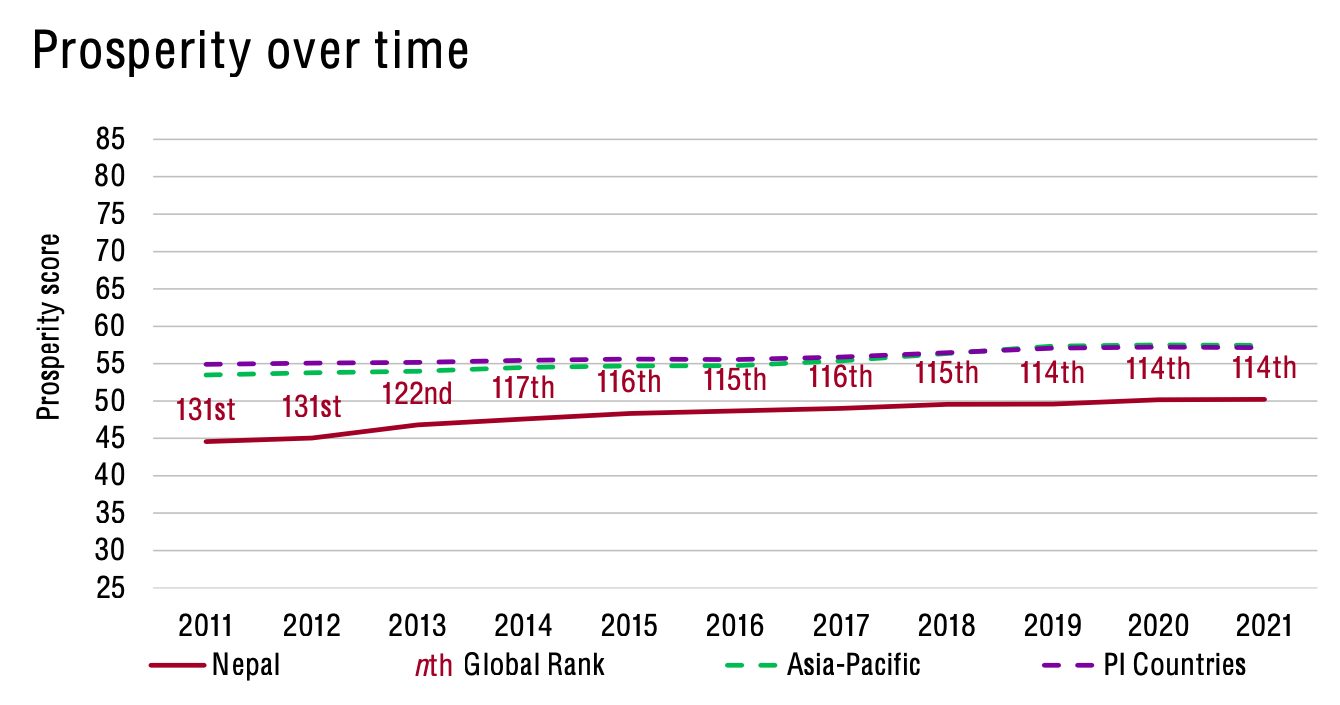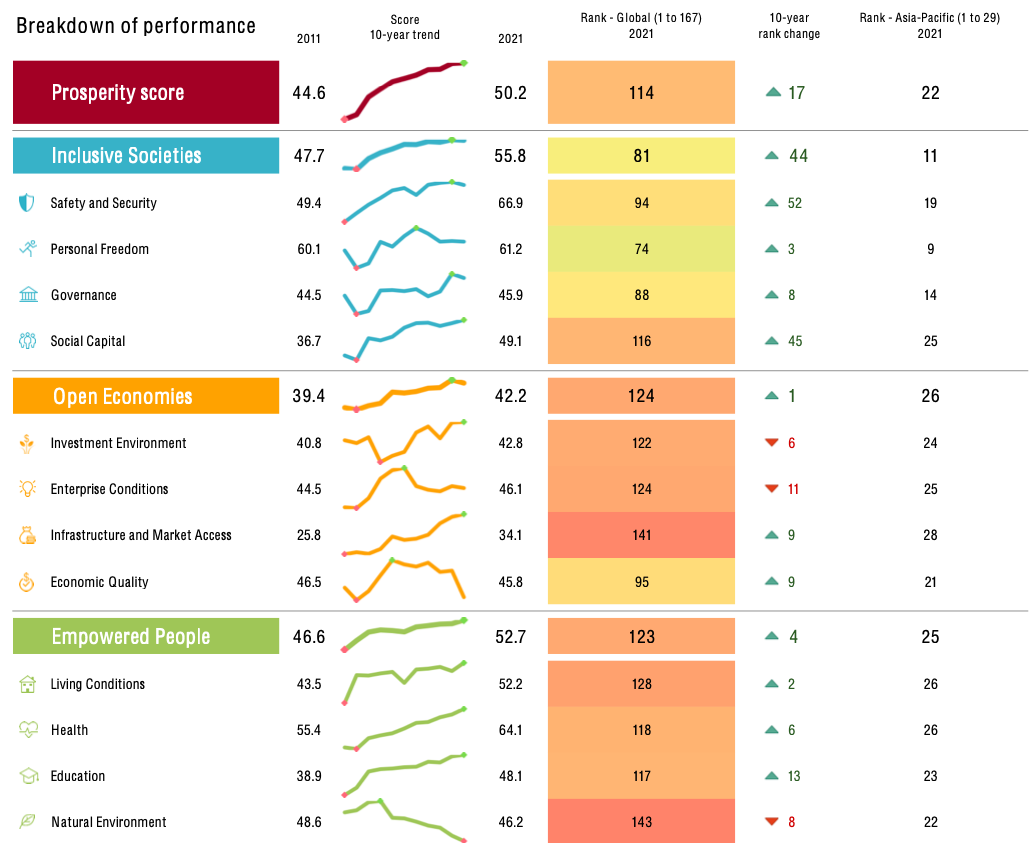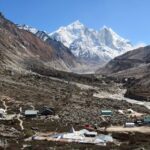Legatum Prosperity Index (LPI), 2021 is an annual report that measures global prosperity under three domains – Inclusive Societies; Open Economies; and, Empowered People. The index is a robust system that identifies indicators that act as barriers to increase prosperity and require reforms. Thus, the report is useful to multiple stakeholders, such as policymakers who can drive policies towards prosperity and journalists who can hold the government accountable. Similarly, it is useful for business leaders to improve business climate, politicians to form policy agendas, and researchers to understand development trends.
Figure 1: Trend of Nepal’s Prosperity Ranking from 2011-2021

Source: Legatum Prosperity Index 2021
Nepal’s performance in LPI 2021
Owing to the health and economic impacts of COVID-19, global prosperity has been stagnant for the past two years. Moreover, the trend of degrading governance, decline in political accountability, and freedom of expression has been observed in all regions of the world. Nepal has ranked 114th out of 167 countries in the LPI 2021. Despite its plateaued performance for the past three years, Nepal’s prosperity has enhanced the most among other countries in the Asia-Pacific region, in the past 10 years. The country has been able to move up 17 places from 131st to 114thsince 2011.
Figure 2: Breakdown of Performance of Nepal
Source: Legatum Prosperity Index 2021
Nepal’s performance can be further assessed based on the three domains of the LPI:
1. Inclusive Societies (safety and security, personal freedom, governance, and social capital): In this domain, Nepal’s performance is remarkable when compared to its performance in the last decade, especially under the safety and security pillar. Nepal has ranked 94th in 2021 and was able to move up by 52 places since 2011. After the end of the decade-long war (from 1996 to 2006), through a peace agreement Nepal was able to graduate from insecurity and oppression of the conflict which led to improvement in prosperity, under this pillar. Furthermore, while the governance pillar has improved over the last decade as a result of the improved rule of law, political accountability, government integrity and effectiveness, and regulatory quality, the impact of current political turmoil and ineffective rules imposed on the public can be detrimental to the rankings.
In the personal freedom pillar, Nepal moved up 3 places up compared to the last 10 years. In the Asia-Pacific region, Nepal has ranked 9th place out of 29 countries. Progress in the pillar was brought by Nepal’s constitution formation and legal reform such as anti-discrimination law that provide protection and freedom to citizens. Regulation like IT bill that limits the freedom of speech and cases of government censorship, and restriction of access to information can hamper Nepal’s position in the pillar.
Nepal has performed astonishingly well in social capital and was ranked in 116th place. It was achieved through strengthening civil and social participation, social networks, as well as in interpersonal and institutional trust.
2. Open Economies (investment environment, enterprise condition, market access and infrastructure, and economic quality): Nepal performed poorly in this domain and ranked in 124th place globally. The performance under the investment environment and enterprise condition have been deteriorating. Investment is the pre-requisite for transforming the economy. In Nepal, foreign direct investment has declined by 14% in the first three months of the current fiscal year. Factors like weak financial ecosystem and unfavorable regulation of the government, such as investment caps that limit the amount of investment discourages FDI. Moreover, the long bureaucratic process, lack of regulations to protect FDI, sluggish improvement in industrial capacity utilization, and high cost owing to the landlocked nature of the country have further discouraged investments. This has led to Nepal’s poor ranking in the investment environment and enterprise condition pillar.
Nepal saw a rise in rank by 9 places since 2011 in infrastructure &market access pillar and economic quality pillar. Infrastructure relating to communication, transportation, and energy has the highest weightage measuring improved under the infrastructure pillar. Nepal has significantly improved on these infrastructures. Internet access has reached 91% of the population. The energy generation doubled in the last decade, becoming an energy surplus nation and began to trade it to India. The length of roads has increased from 21093 km in 2010 to 61395 km in 2020. Nepal still has a shortage of reliable infrastructure as they are not resilient towards climate change. In 2021, damage caused by rain to roads and bridges was NPR 3 billion. Hence, Nepal still has a long way to go in terms of infrastructure.
The economic quality pillar measures labor force participation and the preparedness regarding wealth sustainability of a nation. Nepal is improving under this pillar, especially in the context of labor force engagement.
Globally, only ten nations reported female participation in the labor market over 80% in the past years, with Nepal reporting the highest female participation at 85%.
3. Empowered People (Living condition, health, education, and natural environment): Nepal’s performance in the pillars of living conditions, health, education has risen in this domain. As the government has prioritized them minor progress has been made. Such as in 2016, General Government Health Expenditure (GGHE) was NPR. 40.31 billion, almost double compared to 2013.
In the pillar of education, the ranking has increased by 13 places compared to 2011. The rise in this ranking is a result of Nepal’s effort to increase the quality of education to improve the labor market. Over the last decade, primary school enrollment has grown from 80% to 96%, and secondary school enrollment has increased from 47% to 62%.
Nepal’s performance in natural environment is the weakest and ranks 143rd. The deteriorating air quality to a hazardous level and lack of effort for the preservation of nature has caused the weak performance in the pillar. Nepal’s adoption of Green, Resilient and Inclusive Development (GRID) is a start for a proactive approach to tackle climate change by promoting sustainable development that can help improve its position in this pillar.
Going forward
Transformation is a process rather than an event. Nepal should use the index to identify indicators that act as constraints such as natural environment, investment environment, enterprise condition. The policy makers and the government can further use the index to formulate strong policy to bring improvement in those indicators for sustainable growth. Thus, the index provides a framework that can be used by countries to evaluate their strength and weakness to carve a path towards prosperity.
Pragati Karki is a recent BBA graduate of the School of Business of the University of Kathmandu (KUSOM) with a major in finance. Her interests include financial analysis, risk assessment and accounting. Currently, she is working as beed fellow at beed management.






